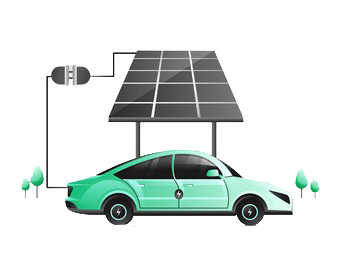Electric vehicles and portable solar panels are undoubtedly the perfect combination. With the rapid decline of renewable energy costs, is it unreasonable to combine the two?
In summer, you can expect solar panels to generate more energy, so charging the battery will be faster. In winter, less sunlight is available, so the charging time will be longer.
 Can you charge the car directly with solar panels? For example, can you install solar panels on your car and let it run on solar energy?
Can you charge the car directly with solar panels? For example, can you install solar panels on your car and let it run on solar energy?
You can charge an electric car with 8 to 12 solar panels. But this is not practical because these cars are too heavy and there is not enough space available. Using solar panels to charge car batteries is more effective.
An electric car consumes about 30 kwh per 100 miles. Of course, some cars are more efficient than others, but we use this number to make a simplified calculation.
30 miles is about 10 kilowatts or 1000 watts. So you need 8 to 12 × 250W solar panels to make a car run 30 miles a day. Five 250 watt Solar panels, each generating 1 kwh per day, can generate 1000 watts of electricity. However, we recommend using 12 to consider energy loss and fluctuations in sunlight intensity.
Flexible solar panels are less efficient than rigid photovoltaic modules. They are portable, but at the cost of efficiency. If you charge your mobile device, it’s no big deal, but charging your car is no big deal.
The weight of solar panels is too large, which will put too much pressure on the roof. Driving in the city means that the panels are blocked by buildings and other structures.
It is feasible and practical to charge electric vehicles with solar panels. With the decline in the cost of solar panels and the improvement of efficiency, it will not be long before we will see electric vehicles use this method more frequently.
